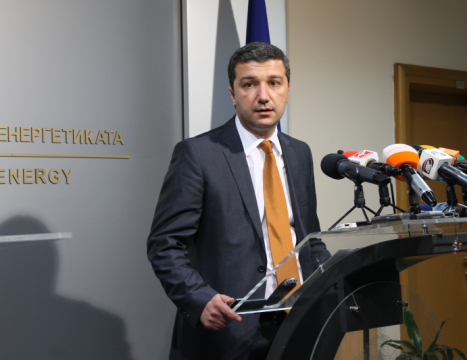
Sign up for our newsletter to receive the latest news and information from publics.bg
News
From Bulgaria

 22.04.2014 15:26
22.04.2014 15:26- Bulgarian minister of economy and energy Dragomir Stoinev
© Bulgarian Ministry of Economy and Energy
Bulgarian economy and energy minister Dragomir Stoinev reasured that the country’s state-owned National Electricity Company (NEC) will not go bankrupt. No exact data about the company's financial state were released however.
“The ministry and the management company are working for improving the financial state of NEC”, Stoinev said during an impromptu conference called by his ministry before Easter.
Despite this, Stoinev presented data from the business plan of the indebted state company which planed a loss of BGN 500 m (about EUR 250 m) for 2013, while the number grows to BGN 700 m for 2014. The minister also cited a report about NEC’s operation from Jan1, 2011 to June 30, 2013, which said that the wildly increasing share of renewable energy, which NEC and transmission and distribution networks operators are obliged to buy entirely at high preferential prices will eventually lead NEC into a liquidity crisis bordering on insolvency.
Minister Stoinev accused the previous center-right government led by the GERB party for accepting such a disastrous business plan for NEC, as well as for all the negative findings of the inspection which also pointed out that no tender procedures were announced by the state-owned company for three consecutive years – in 2011 - 2013. Furthermore, NEC has voted a methodology for setting payment priorities which might have stimulated corruption, Stoinev said. NEC had also bought up renewable energy before the actual date of grid connection of the respective power units.
The company’s CEO Ekaterina Istatkova declined to give precise information about NEC’s full debts, sharing only partial numbers. Istatkova stated that in June 2013, a month after the socialists-led government of Plamen Oresharski took over, NEC’s debt was BGN 24 m, while in February, 2014, it had decreased to BGN 2 m. The company also has failed to pay nearly BGN 1 bn to energy producers – a debt which led electric utilities to withhold payments to NEC amounting to BGN 348 m. Bulgarian distribution utilities are obliged to buy and sell all the renewable energy produced in their networks to NEC, which then sells electricity back to distribution utilities at a single price including all types of production. Delayed payments for renewable energy have pushed regional utilities managed by CEZ, EVN and Energo-Pro to withhold some of their own payments to NEC. The situation has spiraled into a full blown conflict with impending international arbitration, with no settlement yet reached. Earlier last week it became clear that CEZ has started negotiations with NEC to keep its electricity distribution and supply licenses.
 All news from Bulgaria
All news from Bulgaria








 Interview
Interview 
 Full text
Full text Events
Events 


